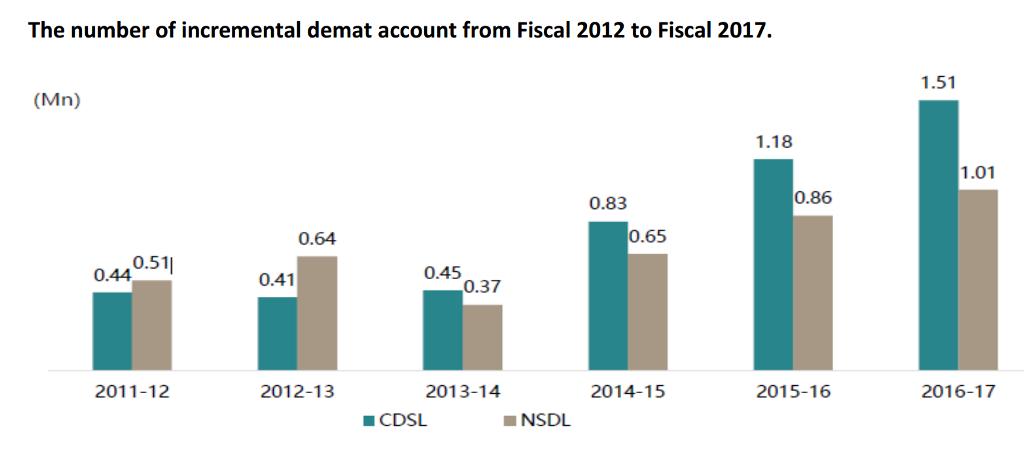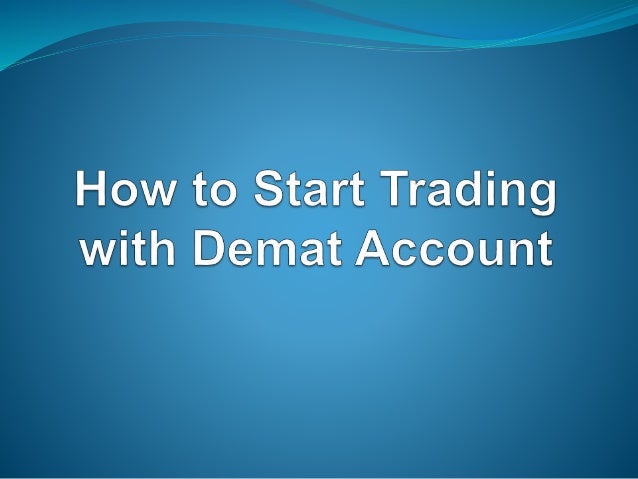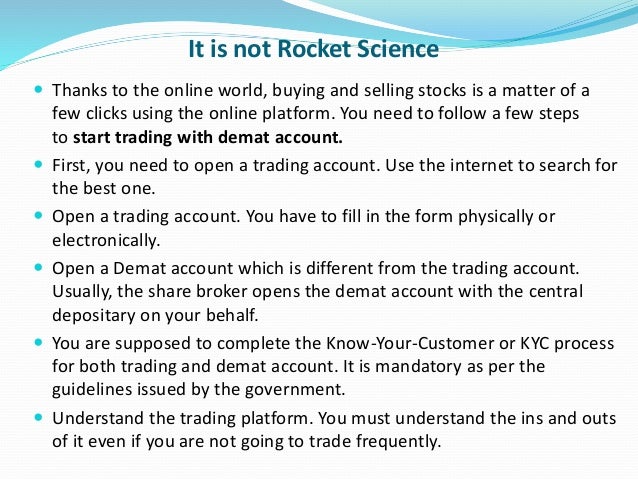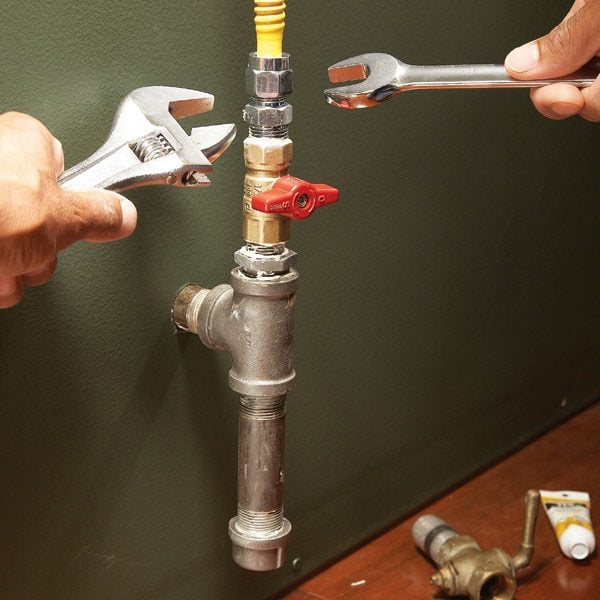Just write the bank account number and sign in the application form to authorise your bank to make payment in case of allotment. No worries for refund as the money remains in investor's account." If you still have any physical share certificates, it is essential to convert them into dematerialised form with a depository.
Dematerialisation is the process to convert physical shares of a company into electronic format. However, the investors can convert physical shares of an active company and trading on the stock exchange. The investors cannot convert the physical share certificates of companies delisted from the stock exchanges into Demat form, and unfortunately, physically held shares are now non-saleable. Prices of following delisted shares are indicative and subject to change. These shares are infrequently traded so we may not be able to provide you a deal even though price is displayed.
What To Do With Delisted Shares In Demat Account We display the prices to update the current market trend to the investors. The actual prices may be at significant variance from what is stated on this website because we may err to judge the correct price of the mkt if we do not transact in any script, which happens for many scripts for several months. Therefore you are requested to call to find out the correct purchase price of following delisted shares.
Many people end up sitting with shares of companies that have delisted from the stock exchanges. The exchanges require such companies to accept share buy-back requests for at least one year after the delisting of shares. The Narayanans are now stuck with Essar Steel shares which delisted from stock exchanges way back in December 2007. The investor should note that he can convert physical form of securities into book entry form in NSDL depository system only if the company which has issued the securities has entered into an agreement with NSDL to offer demat facility.
Existing broker refers to the broker where you have a demat account with. And you want to transfer shares from ABC to XYZ broker. Here, you need to fill in the DIS issued by ABC, attach the client master copy of XYZ broker and submit both the documents to ABC broker. Some of the share certificates held jointly by Shyam and Vinita Narayanan could not be dematerialised.
This was because physical shares can be transferred into a demat account only if the name, its order and the type of ownership of the demat account matches with those in the share certificates. Since the existing demat accounts are in their individual names, they were required to open a new joint demat account to get the jointly-held shares credited into it. They can then transfer it to any one of their existing individual accounts. No need to issue cheques by investors while subscribing to IPO. No worries for refund as the money remains in investor's account. 4) No need to issue cheques by investors while subscribing to IPO.
They can carry either a fixed or floating rate of return. In times of bankruptcy, debenture holders are paid before equity shareholders. Each TM / CM may have their own list of acceptable securities that may be accepted as collateral from client. Funded stocks held by the TM / CM under the margin trading facility shall be held by the TM / CM only by way of pledge.
The securities lying in 'Client Securities under Margin Funding Account' will not be available for pledge with any other bank/ NBFC, SEBI has said. On every stock exchange, various settlements are effected every day such as daily settlement, auction settlement, etc. Each of these settlements is identified by a combination of a market type and a settlement number.
You are required to mention the appropriate settlement details on the delivery instruction slip while transferring the shares to your broker's account. These settlement details are available on the contract note issued by the broker. The balance of your demat account should be 'nil' if you want to close it. Kingfisher Airlines was delisted by NSE in 2018 and you will not be able to sell these shares at present and in future. The easiest way to take care of this issue is to transfer these shares in the demat account of your family member or relative or friend who plan to use demat account for their regular investments. Practically, these shares have become worthless for you, hence transferring it to their demat account should not be a problem.
If you do not have any other holdings in your demat account except these shares then your demat account is a basic services demat account and no annual maintenance charges should be levied for your demat account till the time you close it. The companies can get delisted from all stock exchanges following the substantial acquisition of shares. Company may upon request get voluntarily delisted from any stock exchange other than the regional stock exchange for the company, following the delisting guidelines. In such cases, the companies are required to get prior approval of the holders of the securities sought to be delisted, by a special resolution at a general meeting of the company.
The shareholders will be provided with an exit opportunity by the promoters or those who are in the management control. Physical shares are those shares which the shareholder maintains in physical share certificate form.These shares have not been dematerialized by depositing in the demat account of the investor. Such physical shares are therefore, prone to chances of getting lost and/or getting mutilated/torn.
In the event of loss of such physical shares the shareholder has to follow a series of statutory compliances which includes an application to the share transfer registrar of the company and various other legal formalities. On the successful completion of such formalities the company issues a duplicate share certificate in the name of the shareholder. International securities identification numbers are IDs specific to a company's shares. Dead ISINs belong to companies whose shares are not traded any longer in the stock market.
Does the demat account you wish to close hold dead ISINs? Then, you need to apply to your DP for their dematerialisation. Your DP will forward the request to the concerned depository who will inform the registrar.
The registrar will then take steps to dematerialise the shares. Demat accountsare now compulsory for all investors trading in the securities market. Such accounts come with their own annual fees and maintenance charges.
So, it is wise for investors to close any zero balance or inactive demat accounts that they currently hold. Physical shares can be dematerialized through your broker where you hold demat account. Dematerialization is a process by which the physical share certificates of an investor are taken back by the Company and an equivalent number of securities are credited in electronic form at the request of the investor. As per Exchange, in 'T' & 'TS' group scrips, the buy and sell positions are to be settled on gross delivery basis on each side and netting off is not allowed. Client can buy the shares to extent of exposure available with him and sell the shares in these group scrips only to the extent of quantity of shares available in client's demat account. As such client can not do intra-day transactions in these scrips without having sufficient funds/shares with them.
In view of the above, clients are requested to find out the scrip group before placing the order with the dealer. Clients are also requested to avoid doing BTST trades in these group scrips. Losses arising out of transactions done by client in these scrips including losses incurred on account of auction/close-out due to non-delivery of shares will be borne by the client. In the last few years, the pre-IPO market has opened up and is now available to the masses.
Some investment firms like Analah Capital, TradeUnlisted and Unlistedkart have portals to help investors buy unlisted shares. Shares of these unlisted companies will be held in a demat account. Also, in case of a merger, demerger or split of a company's shares, the old share certificates need not be surrendered to the company as they stand cancelled. In such cases, companies issue new share certificates to the existing shareholders in their records.
Getting one's residential address regularly updated in company records particularly helps in such instances as the new share certificates are mailed to you. By not updating their address earlier, the Narayanans had to submit their residence proof to company registrars with a request to issue new duplicate share certificates. The Narayanans also learned that jointly-owned shares can be transferred to a jointly held-demat account even if the sequence of the holders' name in the certificates is different.
Shyam is the first holder in the joint demat account but a second holder in some of the share certificates, but those shares were transferred to this account by just filling up the "transposition cum demat request form". Since those share certificates had multiple holders, including her father and four siblings, she figured it would take 2-3 months to get them transferred in her name and credited to her demat account before she could sell them. So far, she has managed to "demat" only half of those shares. The stocks mentioned in this article are not recommendations. Please conduct your own research and due diligence before investing. Investment in securities market are subject to market risks, read all the related documents carefully before investing.
Please read the Risk Disclosure documents carefully before investing in Equity Shares, Derivatives, Mutual fund, and/or other instruments traded on the Stock Exchanges. As investments are subject to market risks and price fluctuation risk, there is no assurance or guarantee that the investment objectives shall be achieved. NBT do not guarantee any assured returns on any investments. Past performance of securities/instruments is not indicative of their future performance.
Once the DIS is filled as shown above, you are required to courier us the filled & signed DIS and the stamped client master copy of other demat account in which you want to transfer shared, to our corporate office address. Once the hard copy is received at our office, shares shall be transferred within 7 working days. In case the share certificates are part of the will of a deceased shareholder, then the surviving shareholder has to produce a probate from the court which proves that he is the legal heir. In the absence of a registered will, a succession certificate and a letter of administration from the court has to be obtained and submitted along with the demat request form.
Most of us forget to inform the companies whose shares we hold about changes in our addresses. As a result, we miss out dividends, bonus or new certificates issued by companies. But companies can pay such arrears only up to seven years from the date of declaration of dividend or bonus. That means delisted shares will no longer be traded on the stock exchanges – National Stock Exchange and Bombay Stock Exchange .
The process of delisting securities for any company is governed by the market regulator, Securities and Exchange Board of India . If you are holding shares in your Demat account and want to hold them in physical form, you need to submit an account closure form to your DP and choose the option of Rematerializing your remaining shares in the Demat account. However, you also need to fill up a Remat Request Form along with the account closure form. Once the registrar of the company is satisfied and receives fresh physical certificates, the Demat account is automatically closed.
The reasons for delisting include violating regulations and failing to meet financial specifications set out by the stock exchange. Companies that are delisted are not necessarily bankrupt, and may continue trading over the counter. In order for a stock to be traded on an exchange, the company that issues the stock must meet the listing requirements set out by the exchange. The listing requirements include minimum share prices, certain financial ratios, and minimum sales levels and so on.
If the listing requirements are not met by a company, the exchange that list the company's stock will probably issue a warning of non-compliance to the company. If the company's failure to meet listing requirements continues, the exchange may delist the company's stock. Shares in physical form are semi-illiquid investments unlike dematerialized shares. Some of those physical shares may not be traded over stock exchanges. We provide you the service of buying those illiquid physical shares at spot payment.
Involuntary delisting means the forced removal of a listed company's shares from the stock exchange. Involuntary delisting happens for several reasons such as when there is a violation of the regulations, late or wrongful reporting, or the failure to meet the minimum financial expectations, etc. Monetary standards refer to the ability to maintain the share price, financial ratios, and sales volumes at a requisite minimum. When a company fails to meet the listing requirements, the respective exchange issues a warning of non-compliance to the company. If the issue remains unaddressed beyond specified timelines, the stock is delisted by the listing exchange.
Till now, most brokers did not require any special permission from clients to further pledge their shares as they already held the power of attorney for the demat accounts. The cases involving Karvy and certain other brokers who took their clients's share through this POA are cases in point. SEBI has now set a new process for brokers to take shares as margin from clients. From June 1, shares of clients lying in demat accounts with brokers will have to be specifically marked 'shares pledged for the purpose of margin'. So far, the practice did not require any such specific pledge and merely shares lying in clients' demat accounts held by brokers were considered for the purpose of margin.
The investor needs to transfer the unlisted share which he/she wants to sell with the quantities to the buyers or broker's DEMAT account. The same day when the dealer receives the unlisted shares in his DEMAT Account, the payment is done by the latter via the preferred mode of transfer. A Demat Account or Dematerialised Account provides the facility of holding shares and securities electronically. During online trading of shares or other securities, you can buy and store in a Demat Account. A Demat Account holds all the investments you have in shares, exchange-traded funds , government securities, corporate bonds and mutual funds in one place.
Stocks that trade on an exchange resume trading as soon as an SEC suspension ends, but trading does not automatically resume when a 10-day SEC suspension ends if a stock is quoted in the OTC market . A trading suspension may raise serious questions about the company and cast doubts on the reliability of management and financial information. "While some investors may be willing to buy the company's stock, they will do so only at significantly lower prices," the SEC says. In case you have shares which are in your custody physically then the chances are that those shares may either be registered in your name or still registered in the last shareholder's name but have not be transferred in your name. There are a number of legal and statutory compliances which are required to be followed and are often time consuming processes. For a working professional or a businessman allocation of time for registration of such physical shares is difficult and as such most of us tend to just neglect such physical shares and they remain stacked away as waste paper.
There is a considerable value of physical shares that can be unlocked through our services. Our team would complete the task for conversion and registration of shares so that you enjoy your investments without spending your precious time on legal and statutory activities. Any and all losses and financial charges on account of such liquidation/closing-out shall be charged to and borne by the client.




























No comments:
Post a Comment
Note: Only a member of this blog may post a comment.